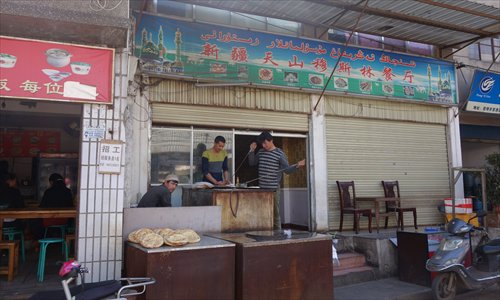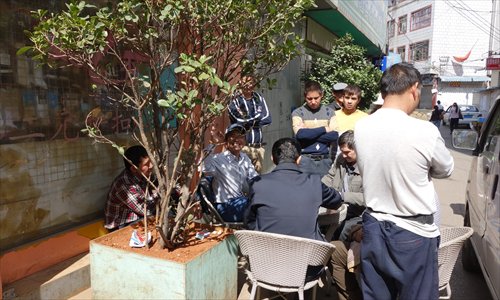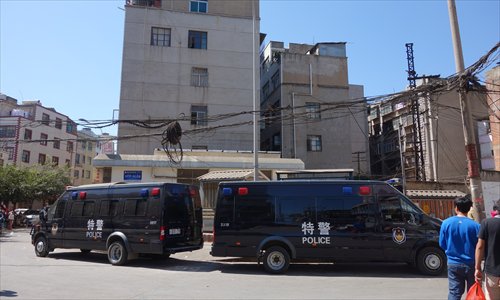Coping with suspicion

Uyghur men cook in front of a Uyghur restaurant in Dashuying community in Kunming, Southwest China's Yunnan Province on Tuesday. Photo: Yang Jingjie/GT
Dashuying, home to the largest Uyghur community in Kunming, capital of Southwest China's Yunnan Province, is around 10 minutes' drive east of the city center. But the shabby buildings and narrow alleys are more reminiscent of a small town instead of the downtown areas of Kunming.
Electric wires twist overhead and illegal constructions on top of many buildings add to the chaotic nature of the area, which Kunming residents claim is a hotbed for crimes, drug use and disease.
The number of permanent residents in Dashuying stands at over 3,700 and the floating population is believed to be around 20,000. The urban village has also been home to a small pocket of Uyghur migrants from Northwest China's Xinjiang Uyghur Autonomous Region since 1998-99, and had around 200 Uyghur residents at its peak.
Many Uyghur residents, who almost always live with people of their own ethnic group, seem disconnected with their neighbors of other ethnicities.
The March 1 attack at Kunming Railway Station carried out by separatist terrorists from Xinjiang, which claimed 29 lives and injured 143, has exacerbated tensions and raised fears that the Uyghur people may be further marginalized by the community and take the hit for what the attackers did to innocent people.
On the fringe
A village official in the area, who asked not to be named, told the Global Times the community used to be on the urban fringe of Kunming. The expansion of the city made it an urban village, with poor infrastructure and an unpleasant environment.
He said the acceptance of the Uyghur community demonstrated the inclusiveness of Kunming. He pointed out that the first wave of migration was seasonal, and that most of Uyghur migrants were fruit vendors. They later settled down and began working at restaurants.
Fang Quan, head of the Dashuying community, put the currant number of Uyghurs in the community at 135 on Monday.
Most of them are from Xinjiang's Yili, Kashi and Bachu.
Asked why Uyghurs chose to live here, the village official and several other Kunming residents all told the Global Times that Dashuying is the only place in Kunming where Uyghurs can find an apartment, because landlords in other areas are reluctant to rent rooms to them.
Abulis, 62, a store owner, moved here 11 years ago with his family, because he wanted to earn more money to support his child's education. He said his landlord and neighbors treated him well and he would like to spend the rest of his life here.
Ablat, 38, came here four years ago and works at a restaurant. The rent for the room he and his wife live in stands at about 600 yuan ($99) a month. Ablat said some of the Uyghurs are considering going back to Xinjiang because of the attack, but he doesn't want to leave because he has a stable job and likes Kunming.
"But I feel embarrassed sometimes," he said. "Those who know me consider me a good person, but others consider me a bad guy because I'm from Xinjiang. They wouldn't say it out loud, but I know they consider people from Xinjiang to be violent."

Uyghur residents play cards outside a Uyghur restaurant in Kunming. Photo: Yang Jingjie/GT
Out of place
Many Uyghurs feel that they don't really fit in the city, and their time is mostly spent within the community.
A melon vendor, who came here three years ago, said he sees no need to go outside the community except to go shopping.
Ablat said he seldom goes out because he only takes one day off every month. And on that day, he tends to just have dinner in the community and drink some beer at home.
The Uyghurs spend most of their leisure time with their own people. They mostly sit outside stores or restaurants run by Uyghurs, drinking tea or playing cards. Some of them can barely speak Putonghua.
Although they live side by side, the lack of communication between the Uyghurs and other residents is obvious.
A store keeper surnamed Zhou said he thinks the Uyghurs here are fine, but that it was unlikely they would say hello to each other, let alone talk more.
A woman surnamed Yang has been working at a Uyghur restaurant for 11 months. She told the Global Times she doesn't really talk with her Uyghur colleagues except for work details, and they mostly speak Uyghur.
"When I finished my shift on Sunday night, it was dark and I was so scared by Saturday's attack that I called my husband to pick me up," she said, adding that the only reason she still works at the restaurant is because she couldn't find another job.
A food vendor surnamed Nie told the Global Times he is a little bit frightened by Uyghurs. "The urban management officers won't fine them, because if they do, the Uyghur vendors would take out their knives," he said.
Uncertainty and confusion
The railway station attack has no doubt taken a toll on Uyghur residents, who said they also loathe the terrorists but feel embarrassed and confused about the measures taken by police.
Since the attack, police have deployed the highest level of security presence both in and outside Dashuying.
A police officer from Kunming's Guandu district, which administers Dashuying, told the Global Times that even though the case was solved on Monday, there hasn't been any order to reduce our security presence. He said the officers had been ordered to check the identities and belongings of suspected people, primarily Uyghurs.
A Uyghur restaurant manager, who asked not to be named, told the Global Times that at 2 am on Sunday, six police officers, all armed, knocked on his door to check his identity. "We were sleeping then and had no clue about what had happened," said the manager.
After lunchtime on Monday, the Global Times reporter witnessed 10 officers, at least one armed, flooding into a small Uyghur restaurant to check identities of diners.
Asked about his view on other people's fears about entering Dashuying as a result of the killing, the manager said in fact "people in Dashuying do not dare go out either."
The melon vendor, 38, told the Global Times he had stopped doing business since Sunday and chose not to go out for fear of getting into trouble. "The police in the community know me and they don't think I have any connection to the attack, but if I go out, there will be questioning by police outside the area," he said.
The police officer from Guandu district said it was "necessary" to take such measures given the severity of the attack, but it doesn't mean the police are targeting all Uyghurs.
Although some Uyghurs said they understand the need to step up security and are willing to cooperate, some were upset about being dragged into the trouble.
Nur, a 47-year-old Uyghur woman who came to Kunming two weeks ago from Yili for medical treatment, said she found the repeated police questioning about her hometown and the purpose of her visit very annoying.
The restaurant manager said the police presence and TV coverage featuring the Uyghur origin of attackers made him feel pressured and sometimes embarrassed about the way how people view them.
"We also hate the attackers no matter which ethnicity they are from," said the manager. "If we had known their plan and could have stopped them, we would have never let it happen."

SWAT vehicles are parked in Dashuying community in Kunming, Yunnan Province on Tuesday. Photo: Yang Jingjie/GT
Management methods
The village official, who has been living in Dashuying for decades, said managing the area is tough, especially after the March 1 attack.
He said there have been cases of conflicts between Uyghurs and residents of other ethnicities or among Uyghurs themselves, but with no casualties.
He said only 20 percent of the Uyghur residents make a living via legitimate businesses, and the rest are involved in theft, robbery and drug dealing.
The police officer also said some of the Uyghurs in the community are suspected drug dealers, but there is no evidence to be able to detain them. He said that the proximity to the Golden Triangle made Yunnan a passage for drug trafficking to Xinjiang.
Reports have revealed that terrorist groups seeking "Xinjiang independence" have been funded by profits made by drug trafficking.
The rail station attack also added to the worries that the Uyghur community may serve as a hideout for terrorists.
In addition to reinforcing security measures, the authorities are also taking a softer approach to minimize security threats.
In late 2012, the Jinma police station, which oversees the area, and Dashuying community jointly established an office near the areas inhabited by Uyghurs.
The board hung on the makeshift office reads "Yaxshi community" in both Chinese and Uyghur. Yaxshi means good in Uyghur.
According to a description on the office's wall, it is responsible for registering Uyghurs dwelling in the area, collecting information about political and security stability as well as monitoring those who tend to commit crimes. Three police officers are stationed at the office.
Fang said it was set up to better serve the Uyghurs, helping them to solve problems in healthcare, social security, employment and children's education. The office also hired four Uyghurs to work as liaison personnel and interpreters.
Feedback from local Uyghurs seems positive thus far.
The melon vendor said the office staff members and the head of Jinma police station come to ask about their lives every once in a while. "They ask us about our health and how local people are treating us," he said.
According to Abulis, the Yaxshi community asks them to attend meetings almost twice a month, and each meeting lasts between one and two hours. The speech made by officials at the meetings is interpreted into Uyghur.
"We were asked to maintain peace, carry on the good work and enjoy our lives. They also told us not to pick fights, make verbal attacks or break the law," said Abulis.
Meanwhile, he said the office sometimes organizes entertainment activities such as playing cards or mahjong as well as billiards.